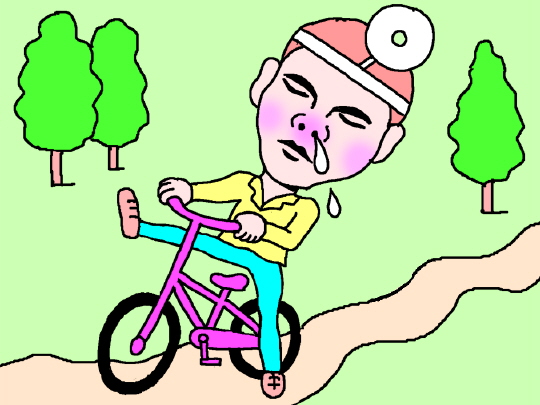남의 병을 고쳐주는 의사들, 정작 본인의 몸에 이상을 느끼면(feel strange) 어떻게 할까.
미국의 위장병학자(gastroenterologist) 닉 리드 박사는 밤에 가스가 차서 배가 불룩해진 것을 없애기 위해(in a bid to banish night-time wind and bloating) 오른쪽 아랫배를 가볍게 두드려준다(pat his tummy low down on the right hand side). 가스가 들어 있는 대장(large intestine) 부분이다.
신경 쓸 일이 많을 때는 가급적 식사를 피한다. 스트레스가 위에 더 많은 위산을 분비하게 해 식도로 튀어오르면서(splash up into the gullet) 속쓰림을 유발하기(lead to a heartburn) 때문이다.

영국의 면역학자(immunologist) 힐러리 롱거스트 박사는 코감기에 걸렸을(have the sniffles) 때 자전거를 탄다. 가벼운 운동(a gentle exercise)이 콧물을 없애는(blow away the nasal mucus) 데 도움이 된다고 한다.
코가 막히면(be bunged up) 호흡하면서 가슴 윗부분만 사용하게 되지만 운동을 하면 가슴 전체로 호흡을 해 상기도(上氣道)를 터주고(clear the upper airways) 콧물을 내뱉거나 삼키게(cough up or swallow the mucus) 한다.
그러나 열이 있을(have a fever) 때는 지칠 만큼 운동을 해서는(exhaust yourself with exercise) 안 된다. 오히려 면역 체계(the immune system)가 병과 싸우는 데서 흐트러지기(divert from fighting the bug) 때문이다.
물리치료사(physiotherapist) 새미 마고 박사는 발에 쥐가 나서 심한 통증을 겪을(suffer from the searing pain of foot cramp) 때면 쭈그리고 앉아 엄지발가락을 자기 쪽으로 가능한 한 세게 당겨준다(crouch and pull his big toe up towards him as hard as he can). 쥐가 풀어질 때까지(until it subsides) 15초씩 그렇게 반복한다.
치의학 박사(doctor of dental medicine)인 앤드루 에더 런던대 교수는 치아와 잇몸 보호를 위해(in order to protect his teeth and gums) 매일 두 번씩 이를 닦는다. 한 번은 일반 칫솔로, 또 한 번은 전동 칫솔로(once with a manual and once with an electric toothbrush) 한다. 치아 뒷면의 닿기 어려운 부분에 접근하는(access the hard-to-reach places at the back) 데는 일반 칫솔이 더 용이하기 때문이다.
비만 상담가이자 영양사(obesity consultant and dietitian)인 릭 밀러 박사는 체중이 올라가면(creep on) 그걸 빼기(shed it) 위해 식욕을 조절한다. 배에서 꼬르륵 소리가 날(the stomach is rumbling) 정도면 칼로리와 지방이 낮은 간단한 음식을 먹지만, 정신적 음식 욕구(mental craving for food)일 경우엔 서둘러 다른 일을 찾아서 한다. 주의를 돌리기(distract himself) 위해서다.
하지만 수동적인 일은 하나 마나 소용없다. 특히 TV를 보는 것은 이래저래 역효과만 낸다며(bring about a reverse effect) 절대 삼갈 것을 권한다.